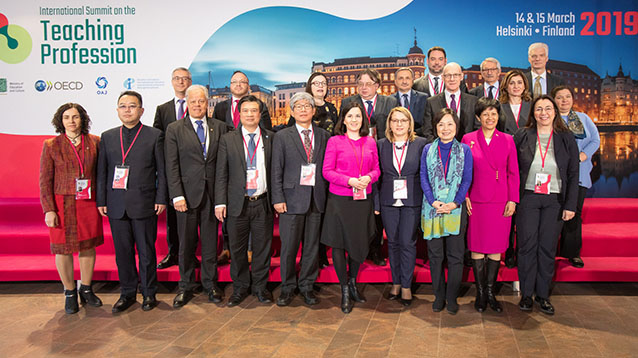Finland the first Nordic country to host summit for education ministers and leaders of teacher organisations

As the first ever Nordic country, Finland hosted the International Summit on the Teaching Profession (ISTP) on 14 and 15 March 2019. The Summit brought delegations of ministers and deputy ministers from 21 countries across the world to Finland. Minister of Education and Culture Sanni Grahn-Laasonen and President of the Trade Union of Education Olli Luukkainen led the Finnish delegation. Early childhood education and care was included in the Summit’s key themes, also for the first time.
ISTP is organised once a year jointly by the Organisation for Economic Co-operation and Development (OECD), the global federation of education employee unions Education International and the selected host country. Previous hosts include Canada, Germany, Holland, New Zealand, Portugal, the United Kingdom and the United States.
This year, 27 countries participated in the Summit, making it one of the largest in ISTP’s history. The Summit brought 21 delegations of ministers and deputy ministers to Finland. In addition, OECD and Education International (EI) had their own delegations, and the European Commission sent observers. Ireland, Moldova, Spain and Vietnam sent a delegation of ministers for the first time. All in all, some 200 international delegates attended the Summit. The Summit programme included seven visits to nurseries and schools.
“We have the best teachers in the world, and it was a wonderful opportunity for me to end my term as a minister by promoting Finnish skills on the world stage,” said Finnish Minister of Education Sanni Grahn-Laasonen.
According to Minister Grahn-Laasonen ja President of Trade Union of Education Olli Luukkainen, many participants had told them that they had wanted to bring a large delegation and stay over for several days, specifically because the Summit was held in Finland. This shows how highly Finnish skills are valued.
The Summit’s key theme was the Future of Teaching and Learning. At Finland’s initiative, early childhood education and care was included in the ISTP session agenda as a special theme.
“Thanks to Finland's efforts, early childhood education and care became a Summit priority. While the importance of early years in the child’s development is increasingly recognised across the world, early childhood education and care has not yet been debated to this extent and at this level,” said Minister of Education Sanni Grahn-Laasonen.
“ISTP 2019 highlighted the importance of staff who have received a thorough pedagogic education in early childhood education and care and, in particular, its significance to all children over the age of three. It shows that, in emphasising staff qualifications, our legislation has taken a step in the right direction,” said President of the Trade Union of Education Olli Luukkainen.
Each year, the countries participating in ISTP draw up commitments concerning their priorities for the coming year. Finland's commitments concern reinforcing learning support, standards of early childhood education and care, and initial teacher training and continuing professional development.
1) Focusing on learning support
Children and students are entitled to the support they need in early childhood education and care. Support must be provided as soon as the need is identified. The extent of the support a student needs may vary from very little to a considerable amount, or the student may need many types of support simultaneously. Similarly, it is important to ensure that the child receives seamless support during the transition from early childhood education and care to pre-school education and then to comprehensive education, and during all the stages of education.
2) Improving the standards of early childhood education and care
High standards of early childhood education and care promote equality in education (and equality in the wider society). Finland has reformed its early childhood education and care legislation and seeks to increase the rate of participation in early childhood education and care. The standards of early childhood education and care should be raised by improving staff competence. High standards of early childhood education and care will reinforce the life-long learning path from the early years onwards.
3) Providing seamless teacher training from initial training to continuing professional development
Teachers’ initial training must provide the right skills and competence for the teacher’s work. Managers of schools and nurseries also need effective training for their demanding roles as leaders of communities of experts. Special attention should be paid to the induction training for those at the beginning of their career.
Inquiries:
Ministry of Education and Culture: Juho Mäki-Lohiluoma, Special Adviser, tel. +358 2951 60812
Trade Union of Education: Anders Rusk, International Coordinator, tel. +358 40 508 3268
Reports, the other countries commitments, photos and further information about the Summit: www.istp2019.fi.

